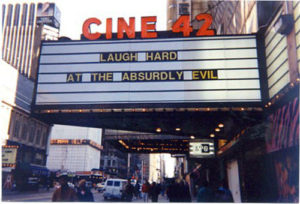Another horrific story, all too familiar.
Pack of pit bulls brutally attack a man and his elderly mother near their home in Modesto. Cops arrive, are forced to kill all four dogs as the couple is rushed to the hospital with critical injuries. Man later dies as a result of “multiple traumatic injuries.” Cops investigate dogs’ owner, who could face criminal charges. The vicous dogs, of course, deserved to be put down after such a gruesome, bloody attack. Such a dangerous breed! Such a terrible propensity! Such a savage cliché!
Awful story. Also one presenting us with yet another opportunity to ask an ongoing question: Why is it always pit bulls? What is it about this particular dog?
Is it because of who tends to own them? Something to do with people demanding this unlucky breed serve as its savage mascot, or how this strong, gentle, square-jawed mutt (“pit bull” being an umbrella term for a conglomeration of breeds with similar traits) remains, sadly, the go-to dog for criminal types (and Michael Vick types) who invariably train them toward violence – and these are, by and large (though certainly not always) the dogs that you read about in the news?
Well, maybe. Partly. After all, you don’t see many thug wannabes cruising the ‘hood with a Goldendoodle.
But wait. Lots of “normal” dog lovers own pits, love them dearly and train them well. And don’t even start with your “there are no bad dogs, just bad owners” trope. It’s a lie anyway, foisted by puppy-eyed misanthropes who love exclaiming how they prefer the company of squirrels over humans. Of course there are “bad” dogs – ill-tempered, aggressive, unfriendly to humans for any number of reasons, not always abuse or poor training.
But those are individual dogs, not entire breeds (and not “bad” per se – just, you know, jerks), and, in the grand scheme of the 1.2 million dogs we kill every year due to neglect, ignorance and general heartlessness, quite few and far between.
So, pit bulls are not “bad” dogs. They are not necessarily a savage or aggressive breed (they’re not a breed at all, more like a type). They are, in fact, enormously affectionate, deeply misunderstood bundles of love, unduly represented in the news simply because of their popularity, and their tragic appeal to abusive hooligans who train them so dreadfully. Right?
Not so fast. Do a bit of homework, and you quickly discover two irrefutable truths: The pit bull is one of the absolute best, most loving family dogs in America, and it’s also the absolute worst, racking up the most attacks, injuries and severe bites (and deaths), coupled to all sorts of fear, fear, fear.
It’s a little bit crazy. Two minutes of Google brings up all manner of heartwarming tales of pits bonding beautifully with humans, babies, families, changing lives for the better; it takes even less time to find dog fanatics eager to dispel every stereotype about the breed: No, their jaws do not lock (that’s impossible). No, they do not have the strongest bite of all dogs (that would be a Mastiff, or maybe a Doberman). No, they are not really hard-wired to fight (though, like many intelligent breeds, they do take training well).
And what does the ASPCA say? “A well-socialized and well-trained pit bull is one of the most delightful, intelligent, and gentle dogs imaginable.” So there.
So why are so many municipalities banning pit bulls? Why will insurance companies refuse you a policy if you own one, or landlords refuse to rent to you? Why do friends and neighbors righteously freak the hell out if you get one and walk it anywhere near their child, their dog, their park? “You got a pit bull? Are you crazy? What the hell are you thinking?
Is it because, mythology aside, the stats really are sort of terrifying, the maulings more violent and even deadly, the injuries more dire than many pit apologists want to admit? Is the fear justified?
I wish I knew. Personally, I’m with those who think the breed is largely misunderstood, “more sinned against than sinning,” and can be extraordinarily loving and wonderful (case by case basis, you know? Every dog is different).
But I also think this doesn’t matter in the slightest. Society has done this breed wrong, and given the stats and the stigma, who’s to say it’s a bad idea to phase the breed out completely, and try again? There are plenty of other choices, millions of less forbidding, less pilloried dogs to choose from. We don’t need pit bulls. Isn’t this what we humans do? Domesticate, appreciate, adore, neglect, adopt a million dogs a year and kill a million more, and then pretend we really love animals and mean well by them? Hey, we invented companion dogs. We created this selfish, domesticate-the-beasts program in the first place. We should have the balls to try and make it better.
But that’s just me.
For a more expert take, I recommend two absolutely terrific, albeit slightly conflicting reads, sure to confound you more, even as they break your heart.
The first comes from the very wonderful Jon Katz, author of a dozen books on dogs – difficult dogs, loving dogs, losing dogs, training dogs, you name it. Katz also used to write a lovely dog-related column over on Slate, and the minute I read the Modesto horror story, I immediately thought of his 2004 piece on pit bulls that might as well have been written yesterday.
The second is more recent, comes from Tom Junod over at Esquire, who’s written zero books about dogs but who nevertheless penned a beautiful, heart-wrenching tale about his own experience owning a pit, and weaves it into the larger, more complex question – actually more like a cruel conundrum – of pit bulls in America.
Is there an answer hovering somewhere between these two views? I vacillate and ponder. After all, I’ve never owned a pit bull. And it’s unlikely I ever will. I prefer Dobermans.
Read more here:: What should we do about all the pit bulls?




